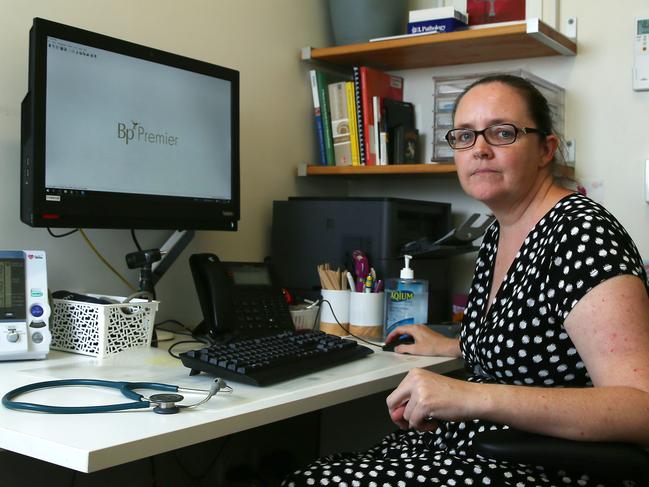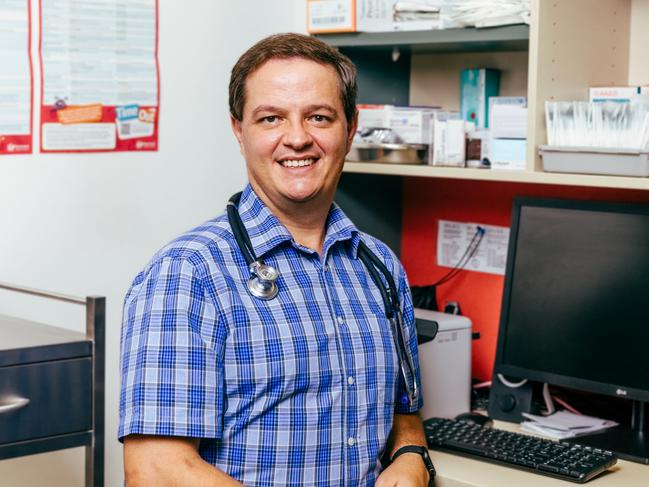Pharmacy trial hailed by government as a ‘success’ despite near-misses
Doctors have revealed some of the potentially deadly complications they have seen in patients diagnosed under a pharmacy trial the State Government is still hailing as a “success”.
QLD Politics
Don't miss out on the headlines from QLD Politics. Followed categories will be added to My News.
Horror stories have emerged of pharmacists missing a 15cm pelvic mass and prescribing dangerous medications to a pregnant woman under a controversial diagnosis trial that the Queensland Government has hailed a success.
Doctors for the first time have revealed some of the potentially deadly complications they have seen in patients diagnosed under the Urinary Tract Infection Pharmacy pilot, as they demand the State Government scrap plans to expand the role of pharmacists even further to diagnose serious conditions.
The UTI scheme, which started in June 2020, has been extended until June 30.
GPs claim Queensland Health is negligent in blocking a pathway for medics to report adverse outcomes of the pilot, putting lives at risk.
The Royal Australian College of General Practitioners is now calling for an independent review and a halt to the scheme as well as an end to the planned North Queensland Pharmacy Scope of Practice Pilot, which would allow pharmacists to diagnose and treat more than 20 serious conditions like heart problems and asthma.
“The UTI pilot complications feedback is only the tip of the iceberg,” Cairns-based GP Dr Aileen Traves said.
“What we are seeing is ‘unconscious incompetence’ where without the proper medical training there would be zero thought of what could go wrong.
“If the North Queensland pilot goes ahead it would be safe to say people could die, certainly there would be more not less pressure on the health system as misdiagnosed patients emerge.”

Dr Traves said pharmacists were an invaluable part of the healthcare system but doctors and chemists should be working together.
“It’s not a turf war – putting serious conditions in front of pharmacists is dangerous,” she said.
Dr Traves said she had spoken to numerous patients whose health and wellbeing had been put at risk during the UTI pilot.
“Of course the Queensland government would say the pilot was a success as they don’t want to hear of the problems, and doctors don’t have a way of reporting back to the pilot organisers,” she said.
“The incidents that have come to my attention during the UTI pilot will send a shiver down the spine of all health professionals.”
The UTI pilot was recently extended but no findings have been released by the state government.
The RACGP and the Australian Medical Association Queensland have resigned from the scope of practice steering committee for the North Queensland pilot amid serious concerns over patient safety.
AMAQ president Professor Chris Perry said his members had heard stories of women suffering prolonged infections because they were given the wrong antibiotics, or where the UTI symptoms were actually sexually transmitted infections or cervical cancer.
“Women have also reported being reluctant to answer potentially embarrassing personal questions within earshot of other customers,” Dr Perry said.
“You cannot declare this trial a success based solely on the number of prescriptions written – people’s health is too important.”
RACGP president Dr Karen Price said if the government was to proceed with the new expanded pilot, then pharmacists should be working as part of a team in the hospital or medical practice setting, rather than in an unsupervised retail space.
“Conducting the pilot in retail spaces means that there will be insufficient training and supervision for the pharmacists,” she said.

“The pilot needs to be focused on the needs of the community, rather than generating profits for pharmacy owners at the expense of their customers and pharmacists.
“Additionally, the government should halt the UTI pilot and launch an independent inquiry.”
RACGP Queensland chair Dr Bruce Willett said the pharmacy scope of practice pilot was riddled with risks.
“When it comes to this pilot, one of the main concerns we have with how it’s currently configured is training,” he said.
“Ultimately, we want pharmacists working within our practice and there may be times when they can prescribe under the supervision of the GP.
“However, under this pilot pharmacists will be operating without supervision in a retail space separate from other healthcare professions, including GPs.”
RACGP rural chair and Townsville-based GP Dr Michael Clements warned that the pilot could fragment care and was not a solution to GP workforce challenges, particularly in the regions.
“If the pilot proceeds in its current form, continuity of care, which is particularly important for patients with complex health conditions, will be disrupted and the GP won’t be aware of what the pharmacist is doing and vice versa,” he said.
“This is unimaginably dangerous when you consider what has happened already during the UTI pilot.
“There is also the conflict of interest that exists.
“It’s important to keep in mind that pharmacists will not only be diagnosing conditions, but then also selling patients medications based on that very diagnosis.”
A recent survey of 1667 people commissioned by The Pharmacy Guild of Australia’s Queensland branch revealed 75 per cent of respondents were in favour of the trial to allow community pharmacists to provide more health services in-store to their patients.
A Pharmacy Guild of Australia Queensland branch spokesman accused the RACGP and AMAQ of sinking to “a new low” to find “alleged instances” of misdiagnosis from the UTI pilot.
The spokesman said all health professionals could report any concerns in relation to patient care through the Health Quality and Complaints Commission.
“As part of the protocol, if someone has unresolved symptoms 48 hours after commencing treatment they are referred to a GP,” the spokesman said.
“The ongoing cancer scare campaign by the RACGP and AMAQ is pathetic and Queenslanders deserve better from doctors who are supposed to look after people not scare them unprofessionally and unnecessarily.”
The spokesman said pharmacists would only be able to treat patients under the new North Queensland pilot after 12-16 months of additional postgraduate university study.
A Queensland Health spokesman said the Urinary Tract Infection Pharmacy Pilot was part of a suite of regulatory changes that was undertaken to improve and support the health of Queenslanders.
“More than 7000 women have accessed the service since its commencement in June 2020, being able to receive immediate advice, treatment and onward referral,” he said.
“For women who accessed the follow-up service, 87 per cent reported that their symptoms had resolved.
“Importantly, consumers who reported persistent symptoms were all referred for medical review and management.
“Overall consumer satisfaction with the service is very high and there have been no significant reported adverse events or safety concerns associated with the UTI pilot.”
CASE STUDIES
CASE ONE
Woman in her 20s with chlamydia was misdiagnosed with a UTI and prescribed the incorrect antibiotic. She had a history of recent unprotected sex but the pharmacist did not consider the possibility of pregnancy or recommend a GP referral to discuss contraception or testing for STIs. The woman turned out to have an undiagnosed pregnancy and yet was given trimethoprim, a category B3 medication which is not recommended for use in the first trimester of pregnancy.
CASE TWO
Woman in her 50s was incorrectly diagnosed with a UTI, when she actually had a 15cm pelvic mass which would have been found if a physical examination had been performed at first instance. Cairns-based GP Dr Aileen Traves said it would have been found if a physical examination had been performed by a GP at first instance.
CASE THREE
Woman in her 60s had a recurrent UTI, which is a risk sign that the patient may have an infection resistant to antibiotics. Wrongly prescribed the antibiotic trimethoprim. GPs do urine tests to determine antibiotic resistance and this patient had been shown to have antibiotic resistance to trimethoprim on multiple previous urine specimens. Her condition deteriorated severely and she ended up in emergency department with severe urosepsis, which is severe sepsis caused by a urinary tract infection





